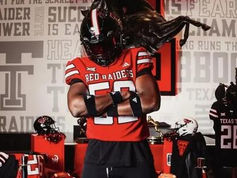Is Felix Ojo’s $5.1M Contract the Final Nail in College Sports’ Amateur Coffin?
- Cedric Hopkins

- Jul 10, 2025
- 4 min read

Felix Ojo’s $5.1 million contract brought out visceral takes on college sports. Some have a sense of relief that college players are finally getting their piece of the pie. Others have become numb to the players receiving money. And still others, like Jeff Pearlman, give off a sense of indignant “non-hater” hating, saying it’s cool that they’re getting paid, but let’s call it what it is: professional sports disguised as college sports. The last group believes college sports is over, as we know it.
Let’s zoom out.
Decades before Ojo’s revenue-sharing deal (not NIL), college sports mirrored professional sports. When students at Ohio State were headed to their first day of class in the Fall of 2022, the Big Ten inked a 7-year, $7 billion media rights agreement with Fox, CBS, and NBC. A decade before that, the deal was worth approximately $3 billion. And that’s just the Big Ten. Doesn’t that deal make college sports seem professional?
Schools could simply broadcast the local games on PBS for everyone to watch instead of using conglomerate, billion-dollar media companies. Why must they insist on making money off the sport?

Schools could provide a reasonable stipend to coaches (provided the coaches also teach at least one class at the college). Instead, coaches have agents who engage in heated negotiations to land $12.5 million per year deals. That seems like a professional sports salary. Why did the coaches demand to get paid so much money for coaching amateurs?
Let’s not forget about Fanatics and other merchandise companies taking full advantage of college sports merchandise, likely making billions. But not without first giving the schools their cut of the profits. Why not just get a mom-and-pop shop to sponsor a team and slap their name on the back of the jersey that’s printed at the local print shop?

Everything about college sports is and has been professional. As a former Division I basketball player, I remember the flights we took and the hotels we stayed in (even for home games), and I can tell you, that was nothing like how it was in high school. I saw then that college sports were big business, just not my business. The players were just the product (not me, per se; I rode the bench).
People like Pearlman want to close the buffet down now that they see players in line with a plate. Somehow the food tastes worse when the players are getting what’s deserved.
What it really boils down to is the fans — who are die-hard fans — don’t want to love the team more than the players do. They don’t want to feel more of a connection to the university than the player wearing the school’s jersey does. That makes fandom feel empty. Having players play for money and not the same love they feel for the school is a betrayal. Ohio State fans recoiled at Kyle McCord’s remark that The Game was just another game, while finding camaraderie with Will Howard when he fully embraced the rivalry.
On a certain level, there’s legitimacy to those feelings. Ojo turning down some of the most storied college football programs to commit to Texas Tech (no disrespect, but Texas Tech is not ‘Bama, Michigan, or the Buckeyes) is clearly about a paycheck. And 4-star wide receiver Xavier McDonald shocked the college football world by committing to Sacramento State over LSU and Ole Miss. McDonald’s decision seems clearly guided by the Benjamins.

But those are the newsworthy stories that demand headlines. The other 100 kids on the team are there because they were a Buckeye, born and bred. They have an Ohio State poster on their wall...er, background on their phone. Their dream was realized after running out onto the field at The Shoe. Those are the colossal majority of college athletes in every university in America.
So both things are true: players are playing solely for teams that offer the most money, which, for some, devalues the college sports experience. Meanwhile, most players are just as invested in the team they play for as you are; they feel incredibly lucky to have the opportunity, knowing it’s their last sports hurrah after spending countless hours practicing on the field or court in the hopes to play after high school.
And maybe that’s the tension we have to learn to live with. College sports have always been big business cloaked in tradition and loyalty, and now the players are finally getting a real seat at the table. Some will chase the bag, others will bleed their school colors — often, both will be true at the same time and on the same team. But whether it’s the kid cashing in or the one living out his childhood dream, they all still have to lace up, line up, and prove it on the field. The love for the game? The players still have it — even if they’re now wearing Louis V cleats — and it should remain inside the fan, as well.










Comments